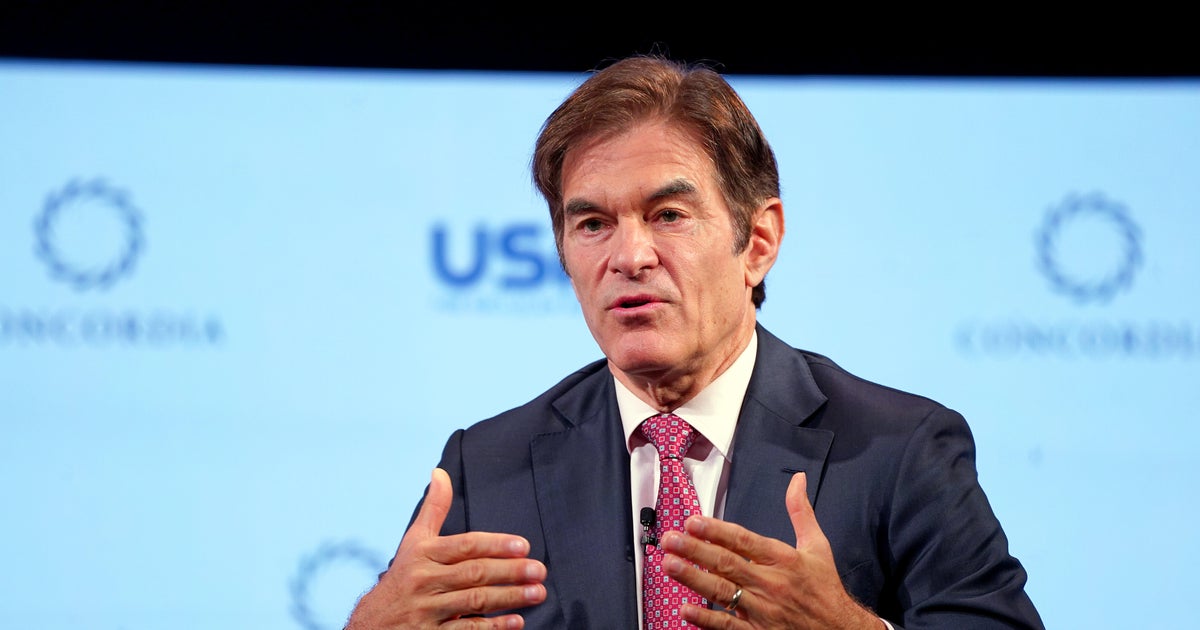Young undocumented immigrants turn to Supreme Court to save DACA
Washington — Standing along the steps of the building where nine justices will soon decide a case that could upend her life and those of hundreds of thousands of other young undocumented immigrants, Eliana Fernández pondered the fate of her two U.S.-born children.
"Depending on how the court rules, it could have devastating consequences," Fernández, 31, said in an interview. "I would lose my protection against deportation, my opportunity to work, I would lose the opportunity to support my children."
The Supreme Court on Tuesday is set to hear oral arguments on the several legal challenges to the Trump administration's decision to end the Obama-era Deferred Action for Childhood Arrivals program, or DACA, which currently shields Fernández and about 700,000 undocumented immigrants who came to the U.S. as children from deportation.
Tuesday's highly anticipated deliberations before the nation's highest court are part of the latest episode in a months-long legal and political standoff over a popular program for a group of unauthorized immigrants that even President Trump, who has overseen a crackdown on both illegal and legal immigration, has expressed sympathy for.
Like Fernández, who came to the U.S. from Ecuador as a teenager, the DACA beneficiaries have lived most of their lives in the U.S., with most of them attending American public schools and universities. To qualify for the protections first offered by President Obama in 2012, these young immigrants had to meet certain requirements, including having arrived in the U.S before they were 16, having lived in the country since at least 2007 and earning an American high school diploma, a GED or serving honorably in the military.
The U.S. agreed to exempt DACA recipients from deportation and grant them work authorization, which most beneficiaries have used to get jobs.
"We're able to contribute to the economy — not only by working and paying taxes, but we also travel, we consume and we have families now," said Saira Barajas, a 26-year-old DACA recipient from Los Angeles.
Some estimates, including one by the libertarian Cato Institute, suggest the end of DACA could mean the loss of hundreds of billions of dollars in economic growth over the next decade.
For Barajas, who came to the U.S. from Mexico when she was 8, her biggest concern ahead of the Supreme Court ruling is her ability to remain in the country with her daughter and husband, who are U.S. citizens. "It would separate me from my family," she said, referring to a ruling in which the court allowed the administration to terminate her protections.
The end of DACA without a successful legislative effort to shield those currently protected by the program would be an unprecedented development in U.S. history. Never before has a form of legal status been granted to such a large group of immigrants only to be revoked, depriving a population of rights after years of integration into American society and subjecting its members to possible deportation.
Fernández, a lead organizer at the immigrant advocacy group Make the Road New York, made the 230-mile trip from New York to Washington not only because she is a DACA recipient, but because she is also one of the several of young undocumented immigrants named as plaintiffs in the cases the Supreme Court will be hearing on Tuesday. Lending her name and story to one of the lawsuits was an easy decision, she said.
"That was the only way that I had to fight for my community, for my immigrant community, but most importantly, for my family," Fernández said.
The end of a prolonged legal battle
For nearly two decades, Congress tried to extend protections for those currently covered by the DACA program and other young immigrants, but several bipartisan legislative efforts collapsed.
After one of these bills failed in late 2011, the Obama administration created DACA in June 2012, with then-Homeland Security Secretary Janet Napolitano announcing her agency would allow certain young unauthorized immigrants to apply for two-year protections, which could be renewed after paying fees.
Mr. Obama admitted then that it was not meant to be a permanent fix. "This is a temporary stopgap measure that lets us focus our resources wisely while giving a degree of relief and hope to talented, driven, patriotic young people," he said at the White House Rose Garden.
After a bipartisan comprehensive immigration reform bill died in the Republican-controlled House in 2013, the Obama administration again took matters into its own hands, issuing another memo in 2014 to expand the existing DACA program and create a new one: the Deferred Action for Parents of Americans and Lawful Permanent Residents, or DAPA, for certain undocumented parents of U.S. citizens and green card holders.
In the summer of 2016, a 4-4 deadlock in the Supreme Court upheld a lower court ruling that declared DAPA unlawful, blocking the program from going forward.
During the 2016 presidential campaign, Mr. Trump pledged to rescind the Obama-era executive orders that created DACA and DAPA. But after being elected, he was initially hesitant to strip these protections from young undocumented immigrants, saying in 2017 it was one of the most challenging issues he faced as president.
"To me, it's one of the most difficult subjects I have because you have these incredible kids — in many cases, not in all cases," Mr. Trump said in February of that year, promising to address the issue with "heart."
In September 2017, however, Attorney General Jeff Sessions announced that the administration would wind down and end the program. The controversial move elicited scathing criticism from immigrant advocates and was met with a flurry of legal challenges.
States like New York and California, advocacy groups across the country and companies like Microsoft sued the administration, ensuring the future of the program would be decided in court.
Finding that the administration ended the initiative in an "arbitrary and capricious" manner — contrary to federal administrative law — several lower courts issued injunctions over the course of months that have, until now, kept the Obama-era program alive. Last year, the administration asked the Supreme Court to take up the case.
After months of litigation, the nine justices will hear arguments from both sides Tuesday to ultimately decide whether it will allow the administration to dismantle DACA. The legal team representing DACA recipients is betting on one argument to convince the conservative-leaning court during the 80-minute hearing to rule against the administration.
"Holding this administration accountable"
When the Trump administration announced DACA's termination, Elaine Duke, who was the acting Homeland Security secretary at the time, issued a memorandum citing a determination by Sessions that the program was unlawful and an overreach of executive power. She also said the same Republican-led states that successfully challenged the 2014 DAPA program would move to challenge DACA in court unless the program was ended.
Sessions said in his determination to Duke that litigation against DACA would likely "prevail" because courts had blocked the DAPA program.
But in a press conference to unveil the decision in September 2017, Sessions said the administration ended DACA because it considered it an incentive to illegal immigration and the catalyst of a surge of unaccompanied migrant children coming to the U.S.-Mexico border in 2014. He did not cite any evidence for these assertions, which have largely been debunked, since the program would not have covered children coming to the U.S. in 2014, nor future undocumented immigrants.
When a federal judge in Washington in early 2018 gave the administration another opportunity to justify the end of the program, then-Homeland Security Secretary Kirstjen Nielsen said it was important to "project a message" to would-be border crossers by nixing DACA.
"Considering the fact that tens of thousands of minor aliens have illegally crossed or been smuggled across our border in recent years and then have been released into the country owing to loopholes in our laws — and that pattern continues to occur at unacceptably high levels to the detriment of the immigration system — it is critically important for DHS to project a message that leaves no doubt regarding the clear, consistent, and transparent enforcement of the immigration," Nielsen wrote in a June 2018 memorandum.
But the federal judge in Washington said that even if Nielsen's memorandum served an "amplification" of Duke's initial memorandum, rather than "a post hoc rationalization," the new rationale was "too little, too late."
Lawyers representing DACA recipients will try to highlight this contention on Tuesday, hoping to convince the majority of the justices that the administration failed to provide a thorough justification for ending a popular program while shifting its rationale on several occasions, making assertions that were not based on fact.
"What's at stake is holding this administration accountable for complying with basic administrative law and engaging is reasoned decision-making before suspending what we know is a tremendously successful program," Araceli Martínez-Olguín, an attorney who will be part of the legal team asking the court to keep DACA alive on Tuesday, said in an interview.
Martínez-Olguín, who works for the California-based National Immigration Law Center, conceded that the administration can terminate the program. But she said it did so in an unlawful way to avoid accountability and to punt the controversial decision to the courts. If the Supreme Court sides with the administration, Martínez-Olguín said the repercussions would reverberate well beyond this generation of DACA recipients.
"If the court determines that the administration engaged in enough decision making around DACA, that means that this administration — and administrations to come — can similarly give very little reason for its actions, which will make it very difficult to then be able to hold politicians accountable," she said.
"I belong in this country"
Carolina Fung Feng, 30, knows what she would tell the nine justices if she had the rare opportunity to stand before them on Tuesday to argue her case to stay in the U.S., where she has lived in ever since she and her parents moved from Costa Rica when she was 12 years old.
"I would tell them that I'm just a human being who came to this country looking for better opportunities. I haven't done anything wrong. I belong in this country. This is the place that I grew up in and where my friends and family are," she said in an interview on the steps of the Supreme Court.
The end of DACA would prevent Fung Feng, who is listed as one of the plaintiffs on one of the cases being heard Tuesday, from continuing to work as a GED instructor for adult learners at a library in Brooklyn. But she said she will always identify as an American, regardless of the Supreme Court's ultimate decision.
"I belong here," she said.
Fellow DACA recipient Diana Pliego agrees. The 25-year-old immigrant, a policy associate at the National Immigration Law Center, said an unfavorable Supreme Court decision would insert even more uncertainty in her life.
"There would be a lot more fear," she said in an interview. "Any encounter with law enforcement could quickly escalate and lead to, potentially, deportation. Our everyday reality would change dramatically."
Returning to Mexico, a country she left when she was 3, is not an option for Pliego.
"This is my home. This is the place that I want to continue living in. This is where I have built everything that I know," she said. "To put me at risk to go back to a place that I don't know and that isn't home, it's just not right."








